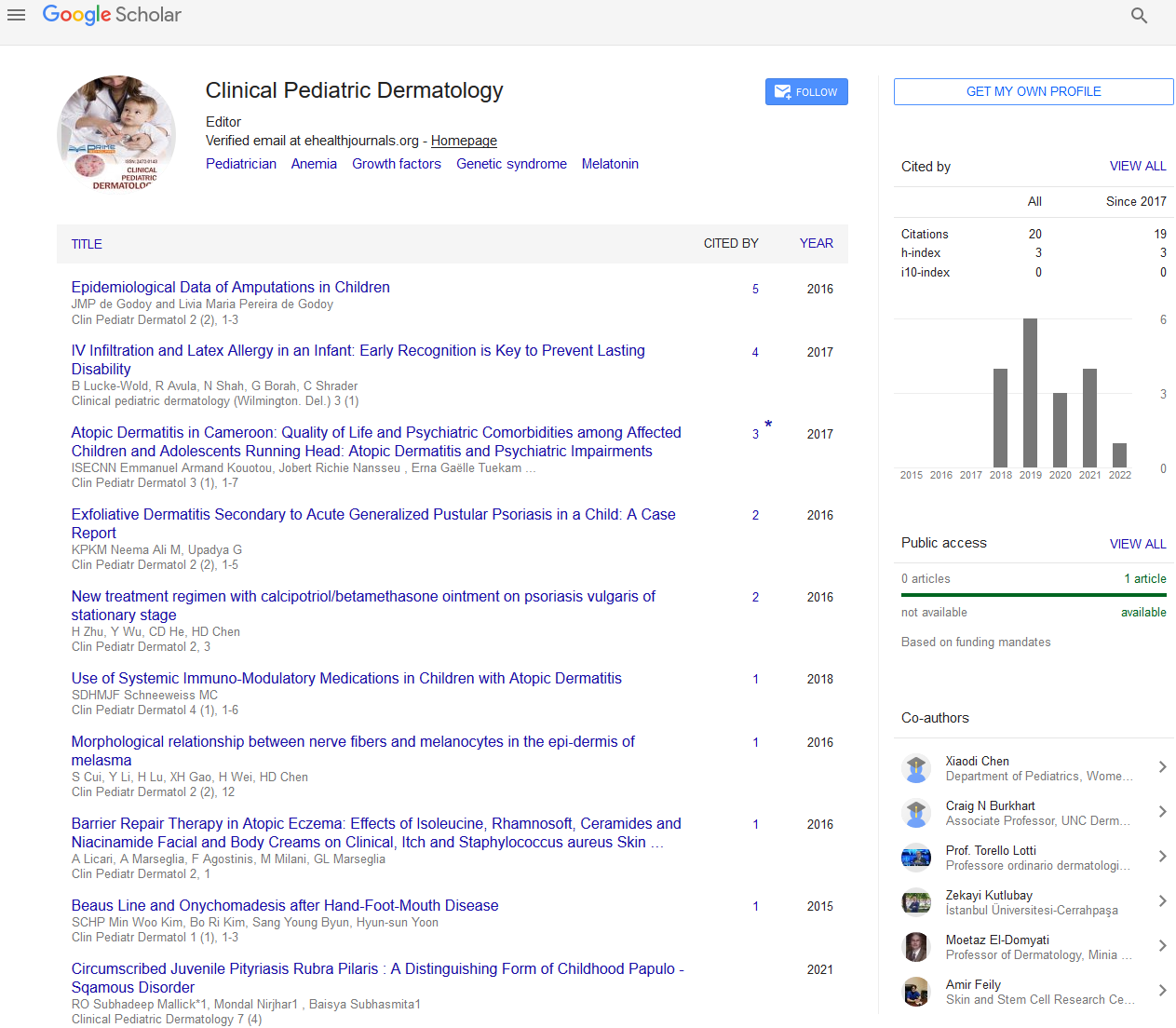Opinion - (2023) Volume 9, Issue 4
Enhancing Health and Wellness through Dermatological Treatments
Louise Orbell*
Department of Dermatology, University of Sao Paulo, Brazil
*Correspondence:
Louise Orbell,
Department of Dermatology, University of Sao Paulo,
Brazil,
Email:
Received: 29-Nov-2023, Manuscript No. IPCPDR-23-18669;
Editor assigned: 01-Dec-2023, Pre QC No. IPCPDR-23-18669 (PQ);
Reviewed: 15-Dec-2023, QC No. IPCPDR-23-18669;
Revised: 20-Dec-2023, Manuscript No. IPCPDR-23-18669 (R);
Published:
27-Dec-2023, DOI: 10.36648/2472-0143.9.4.38
Introduction
Skin therapy encompasses a diverse range of treatments and interventions
designed to address various dermatological conditions,
promote skin health, and enhance overall well-being. From
managing common skin ailments to advanced therapeutic interventions,
skin therapy plays a crucial role in improving the quality
of life for individuals across different age groups and diverse skin
types. This article delves into the realm of skin therapy, exploring
its significance, evolving trends, innovative treatments, and the
holistic approach it embodies towards skin health. Skin therapy
encompasses a spectrum of interventions aimed at diagnosing,
preventing, and treating skin conditions, ranging from mild disorders
to severe dermatological diseases. It involves a multidisciplinary
approach, integrating medical, cosmetic, and surgical techniques
to address diverse skin concerns. Skin therapy addresses a
wide array of conditions, including acne, eczema, psoriasis, rosacea,
dermatitis, fungal infections, pigmentation disorders, and aging-
related changes. Each condition requires tailored therapeutic
approaches based on its etiology, severity, and individual patient
factors. Topical therapies, such as creams, ointments, and lotions,
form the cornerstone of many skin therapies. They deliver medications,
moisturizers, or active ingredients directly to the affected
skin, addressing conditions like acne, eczema, and psoriasis. Phototherapy
and laser therapies utilize light-based technologies to
target specific skin issues, including psoriasis, vitiligo, acne, and
signs of aging.
Description
These non-invasive treatments offer targeted solutions with minimal
downtime. Some dermatological conditions require systemic
medications, including oral or injectable drugs, to manage severe
or widespread conditions like autoimmune diseases or severe
acne. Cosmetic skin therapies, such as chemical peels, microdermabrasion,
dermal fillers, and Botox injections, aim to enhance
skin appearance, reduce signs of aging, and improve skin texture
and tone. The role of nutrition and lifestyle factors in skin health
is increasingly recognized. Skin therapy often integrates dietary
recommendations, stress management, and lifestyle modifications
to support overall skin wellness. Educating individuals about
proper skincare routines, sun protection, and early detection of
skin changes is crucial in preventive skin therapy. Regular screenings
and self-examinations help identify potential issues early on.
Advances in genetics and personalized medicine are shaping the
future of skin therapy. Tailored treatments based on an individual’s
genetic makeup and specific skin characteristics promise
more precise and effective interventions. The integration of biotechnology,
including stem cell therapies, nanotechnology, and
bioengineering, holds promise for revolutionary advancements in
regenerative skin therapies, wound healing, and scar reduction.
AI-powered tools for skin analysis and diagnostics are transforming
dermatology. Machine learning algorithms aid in the early detection
of skin cancers, analysis of skin lesions, and personalized
treatment recommendations.
Conclusion
Growing consumer interest in natural ingredients and sustainable
skincare products is driving innovations in eco-friendly skin therapies.
Bio-based compounds and environmentally conscious formulations
are gaining popularity. Ensuring equitable access to quality
skin therapy, especially in underserved communities, remains a
challenge due to various factors, including geographic limitations,
healthcare disparities, and affordability issues. The safety and efficacy
of emerging skin therapies, particularly in the realm of biotechnology
and AI, require stringent regulatory oversight to safeguard
patient well-being and prevent potential risks. Skin therapy
represents an evolving landscape that merges science, technology,
and holistic approaches to enhance skin health and address dermatological
concerns.
Citation: Orbell L (2023) Enhancing Health and Wellness through Dermatological Treatments. Clin Pediatr Dermatol. 9:38.
Copyright: © 2023 Orbell L. This is an open-access article distributed under the terms of the Creative Commons Attribution License, which permits unrestricted use, distribution, and reproduction in any medium, provided the original author and source are credited.

